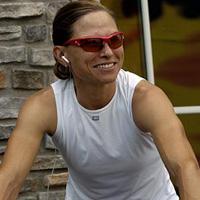
Recently on Cyclingnews.com |
An interview with Shonny Vanlandingham, September 28, 2005
Shonny shines in 2005
Shonny Vanlandingham is the definition of a professional athlete and deserves the term for a lot of reasons - she's naturally gifted, trains intelligently and consistently and manages her diet. She knows how to recover, has a competitive spirit and carries herself with an air of confidence and calm that lets you know that mountain biking is not only her sport and her passion, but her job. Cyclingnews' Steve Medcroft spoke with Vanlandingham about becoming the best women's mountain biker in the US in 2005.
Shonny Vanlandingham
Age: 36 Career highlights2005 1st, US Short Track National Championship 2004 1st, NORBA XC Series Championship 2003 3rd, NORBA XC, Schweitzer Mt, Idaho 2002 4th Overall, NORBA National Mountain Bike Series, XC 2001 9th, World Mountain Bike Championships, Vail, Colo. |
Vanlandingham also deserves the term of professional athlete because when her professionalism is tested, she seems to always rise to the challenge. In the US National Championship Cross Country, for example, when she flatted in the final mile and lost a dominant lead to finish fourth after walking her bike across the line, it took focus to stand at the finish, wipe the disappointment from her face and congratulate Mary McConneloug on her win.
On the NORBA circuit she rose to the challenge race after race. After a DNF in the season opener in Texas, she only ever yielded first place twice in seven more cross country races. That menas five wins in seven races - a great winning record for a year.
Speaking of the number of wins; the biggest example of her professionalism in 2005 came time and again when almost everyone in cycling referred to her number of wins as one less than it truly was. The confusion lay in the scoring of the second NORBA weekend in Phoenix, Arizona. Top official points in the Cross Country series scoring actually went to the winner of that weekendís three-race omnium (Trekís Sue Haywood), not the first woman across the line in the cross country (Vanlandingham). That confusion was so pervasive, Vanlandingham found herself reminding and correcting everyone from journalists, PA announcers, podium presenters, sponsors and other riders. Like a true professional, she smiled and nodded understandingly when everyone made the same mistake over and over, and was patient when she brought the distinction of her accomplishments to the person making it.
So Shonny Vanlandingham is the consummate professional athlete. And although she says itís what sheís always wanted to be, there was a time not too long ago that she had given up hope of it ever happening.
It all started in Arlington, Texas where Vanlandingham ran track and played basketball in high school (Evangel Temple in Grand Prairie, Texas; graduated 1987) and ultimately earned a college degree on a full basketball scholarship at East Texas State University. ďBasketball was my first love,Ē she said from her home in Durango, Colorado two weeks before winning the NORBA Series final in Mount Snow. She had always wanted to become a professional athlete but ďwhen I graduated, there wasnít a WNBA so I gave up on the idea.Ē
Instead, Vanlandingham moved around, searching for a new path. The search led her to Maui, Hawaii and it wasnít until she was 27 that the dream of becoming a pro athlete came alive again.
Cyclingnews: What were your career options coming out of school?
Shonny Vanlandingham: I had a degree in nutrition so I was thinking of going into dietetics or possibly going back for a masters degree in physical therapy or sports nutrition. The plan was to work with professional football or basketball teams; they have nutritionists and dieticians on staff these days.
CN: You wanted to stay around athletics but it didnít pan out?
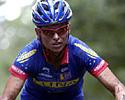
|
SV: It didnít. I moved to Hawaii shortly after I graduated from college and worked as a bicycle tour guide. Gravity tours. You drive people to the top of the volcano so people donít have to ride up. Then itís all downhill. We did it on cruiser bikes with drum brakes. I didnít have a car so I was riding my bike across the island to work and back every day; maybe fourteen miles each way.
CN: How long were the tours?
SV: Most of the day. Weíd go up for sunrise. The customers would watch the sunrise then weíd ride for an hour or so. Youíd stop and take pictures. Itís really beautiful. Weíd eat breakfast halfway down then ride for another hour or so. The whole day would take four or five hours.
CN: Why did you move to Hawaii?
SV: I moved to Myrtle Beach, South Carolina with a friend of mine from college just to do something different before I got a real job, then my sister (Vanlandingham has one older brother and one older sister) called and said Ďweíre moving to Maui, why donít you come?í I didnít have any ties so I figured why not. We all shared a condo.
CN: Okay, the better question might be then how did you ever leave?
SV: I actually have never fully left. I own a condo on Oahu so I go there in the wintertime to train; Durango sometimes gets too snowy and cold and we kind of put in long hours at that time of the year.
CN: What brought you back to the mainland?
SV: Mountain biking. In 1997, I learned that people were riding mountain bikes for a living and that there was a full-on race circuit. I figured Colorado would be the best to start because there was a ton of mountain biking here. And my parents had bought some land; 40 acres out in Pagosa Springs (where Vanlandingham coached the girlís high school basketball team), which is about an hour East of Durango. I bought a little fifth-wheel trailer, stayed there for the summer and started riding my mountain bike. At the end of the summer I did a couple of beginner races in the old Colorado mountain bike series. In 1998 I turned expert and raced the whole Colorado series.
CN: Right from beginner to expert; were you fit enough when you first started to be competitive or did it take a lot of work to make the jump in classes?
SV: I was pretty fast as a beginner. I think I had some natural athletic ability just because Iíve played sports all my life. I grew up riding motorcycles so that really helped me too. I got second in the first race I ever did and won the second. When I got to the expert level, though, it was tougher and I actually had to start training. I think I placed tenth or so in my first expert race. My competitive nature came out after that and I thought Ďman, Iím going to have to train so I can win.í
CN: Iím curious about making the jump to wanting to be a professional racer. How did you know youíd like or would even be good at it?
"I still think that I have room for growth."-Vanlandingham is always looking to improve herself. |
SV: After I finished playing basketball, I gave up the dream of playing professional sports. There werenít really any opportunities to play except overseas Ė and I did that; I played basketball in Brazil. But I wasnít ready to move to a different country so I put a pro athletic career on the back burner. When I learned about mountain biking, that people were making a living riding a bike, I thought ĎWow.í I mean, to play any sport and get paid as a professional! Ė I was fired up about it. I wanted to get to the pro level as quick as I could because I started so late; I was 27. I knew I couldnít mess around too long as an amateur. I made it to pro in 1999.
CN: Were you sponsored right away?
SV: I was very blessed. KHS had a team that traveled the NORBA circuit and the guy who managed the team had seen me race as an expert and gave me a chance. I wasnít making a salary but they had a bonus programme and they were paying my expenses. Looking back on it, I realise how few and far between those opportunities were.
CN: How did that first series go?
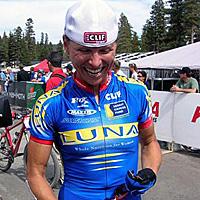
|
SV: In í99, my first NORBA National was Big Bear. I went into that race not knowing who any of the pros were because I was new. I had a good race and ended up fourth; on the podium in my first ever NORBA. It was a big eye opener and confidence builder for me to realise that maybe I could actually compete at the top level. I had a few other top tens that year; a pretty encouraging year for a rookie pro. KHS folded the team at the end of the year and I was able to get on the SOBE program for 2000. It was a step up for me in that I was making a little bit of money and had great support.
CN: Youíre primarily a domestic-focused racer?
SV: Right. Mostly NORBAís. Iíve never done a full World Cup schedule and usually only do the domestic World Cups (Quebec and Angel Fire this year). Of course, last year was an active World Cup season because I was chasing the Olympic dream; playing catch up on UCI points because I had been injured the year before.
CN: You were on the SOBE Team. One of the things that happened to you during that time was you were featured in a SOBE commercial (in which an indecisive convenience store shopper stands at coolers of drinks while extreme sports stars come in one after the other and each grab a SOBE). What was that experience like?
SV: That was a great experience. At that time, SOBE sponsored a lot of different athletes and chose only three for the commercial so I was honoured. Not only was the whole experience of shooting the commercial great, but it was great because you get paid and you keep getting paid every time the commercial runs. They ran that commercial quite a bit which gave me a boost financially.
CN: How much time was there involved in the actual process?
SV: Just two days. They flew us all out to Universal Studios in Hollywood. We did a costume fitting one evening and then shot the next day from eight till ten at night. That was it; one solid day of work. Itís amazing what goes in to a 30-second commercial.
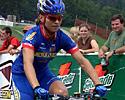
|
CN: A costume fitting? You werenít just wearing your standard issue cycling gear?
SV: They tailored my uniform. They made the top as tight as possible. They took up the back and cut the sleeves off so you can see my deltoids. It was originally just a regular team jersey but after the commercial shoot, I gave it to my eight-year-old niece; thatís how small it was.
CN: How have your racing seasons gone since then?
SV: I got on the podium three or four more times my second season. The next year, I got on the podium maybe double that. Every year I gradually have gotten a little bit faster and more consistent.
CN: You signed with the Luna Chix team in 2003 and had an injury at the very beginning of the season - tell us about that.
SV: It was at my very first race with the Luna Chix team. At Sea Otter. They were very supportive. We have injury clauses in most of our contracts these days but they knew it was an accident and I was doing everything I could to get back so even though initially I was stressed, they made it easy. And then at that point you just have to realise that it does happen when youíre a professional athlete. You get injured. It happens to people all the time. You hate for it to be you but it happens. So then you just have to focus your energy on coming back and I have a great coach here in Durango (Rick Crawford). He really helped me to keep my mind straight and realise that I would be back stronger. And it turned out great. I came back strong at the end of the season and one I won my first NORBA (in Durango).
CN: In 2004, you won the overall NORBA Series?
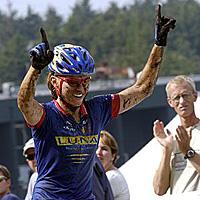
|
SV: I won the Big Bear Cross Country and Short Track. Then I won in Durango as well. Then I had some seconds and some thirds - some pretty solid results.
SV: How would you like to evolve as an athlete from here?
CN: I still think that I have room for growth. I mean I feel like, so far, Iíve continued to improve and get more consistent year after year so Iím looking forward to a few more years of that. Where I would like to evolve as an athlete? Iíd like to just continue to see what Iím capable of. Iíd like to improve on my weaknesses. My win in Phoenix (2005 NORBA Series Cross Country) was really encouraging because people know me as an altitude racer but Iím trying to get better at the sea level Ė better on power courses (Phoenix sits at 1,800 feet alititude). That win showed that I am evolving and becoming a better all-round biker.
CN: Do you believe that the age limitation we used to put on athletes - that mid thirties was the ceiling for performance - can be challenged if an athlete applies themselves?
SV: I donít think itís true that a thirty-plus athlete is beyond their prime any more. Itís probably because weíre seeing guys like Ned Overend prove the theory false. A lot of the limits people have on performance are their own mental restraints. Now that we have examples of older athletes who are able to maintain and even gain in performance, I think the mental constraints will lift off a lot more people. Itís like the four minute mile. Once Roger Bannister (a 25 year old English medical student) ran a four-minute mile (in 1954), all these other guys started running four-minute miles (five new sub four-minute records were set in the next ten years). We cap ourselves mentally when physically we can do a lot more than we think.
CN: Would it be safe to say that you consider yourself in the middle of your career and not looking at retirement any time soon?
SV: Especially because I started so late. Cycling is a sport of perseverance; itís not always the most talented who excel. You need talent yes, but success comes to those who can persevere and can put in the work. Itís an accumulative fitness sport. I feel like Iím coming into my best years now.
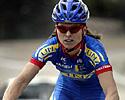
|
CN: You defended the series title in Cross Country but you were at risk after posting zero points in the first race (The one-race drop rule meant that Vanlandingham would have to use her Tapatio Springs result as her drop and could only win the series by posting good results at every other race). What happened?
SV: I was in Texas but had spent the off season rehabbing a leg I broke last year at Worlds. I was able to ride but I wasnít able to run and in Texas, there was this crazy downpour just before the race. I did the time trial and did okay; third or fourth. In the Short Track I was also on the podium. Then we got to the cross country and it was so muddy, I had to drop out because I couldnít run so I got zero points for that race. Itís nerve racking when you use up your drop early on because youíre thinking Ďoh, I canít have a mechanical or I canít have a bad day.í But you have to put that out of your mind and not focus on the negative, hope you can be consistent the rest of the season and get that drop at the end.
CN: What does winning the overall NORBA title mean to you?
SV: The series matters. Everybodyís out there trying to win that thing because it shows who the most consistent riders are for both the short track and the cross country. The one day national is great too - because it shows who can prepare for and peak that one day - but series championships show who can maintain their fitness over a season. Because we race at altitude and sea level, because we have climbing courses and power courses, the series shows off the best all-round rider.
CN: What do you do outside of racing?
SV: I like other outdoor activities. If I stay in Durango, before I have to head off to Hawaii, I do some snowboarding. I have a trampoline. I still have a motorcycle so I ride that; a Kawasaki 220 ABX. I also have some rental properties that I take care of; a couple here in Durango and one over in Hawaii.

